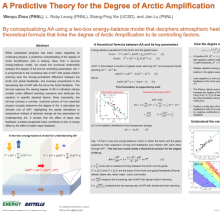A simple theory for the degree of Arctic Amplification
Wenyu
Zhou
Pacific Northwest National Laboratory
Poster
Arctic Amplification (AA), referring to the amplified surface warming in the Arctic relative to the globe, is a robust and impactful feature of climate change. While the drivers and contributing feedbacks to AA have been well depicted, a quantitative theory that predicts the degree of AA from the strengths of its drivers and feedbacks is lacking. Here, by considering a two-box energy-balance model of the globe and Arctic, we estimates the degree of AA as a theoretical function of the ratio between the Arctic and globe radiative forcing, the sums of feedback parameters, and the sensitivity of atmospheric heat transport to the Arctic and global temperature. The theory well captures the degree of AA in individual CMIP6 model and is applied to understand the causes of the widely spread AA among models.

zhou-wenyu-polar-poster.pdf
(1.23 MB)
